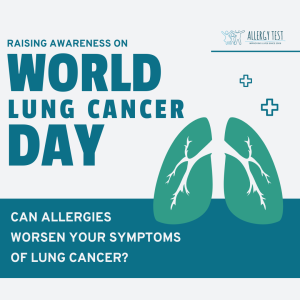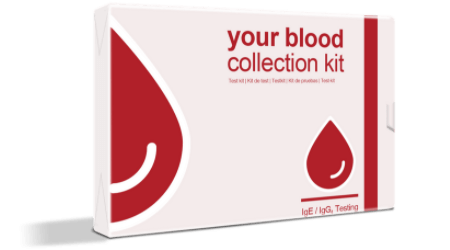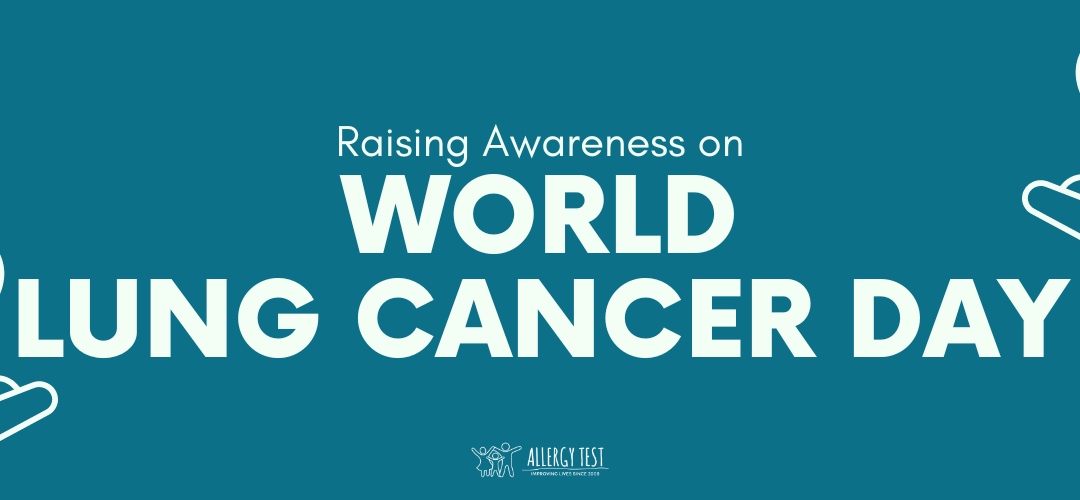Getting cancer is most people’s worst fear — and with good reason. Today is World Lung Cancer Day, and instead of simply a day that passes by as we think of those impacted by the disease, we can use it as a tool to broaden our minds and understanding of lung cancer so that it becomes a day of empowerment. Did you know that lung cancer and allergy symptoms can be similar? Below, we’ll discuss the important role of allergy testing in determining what you’re dealing with and also help you understand how properly diagnosing an allergy can help you manage lung cancer symptoms.
What are common lung cancer symptoms?
Let’s start with understanding some of the most common lung cancer symptoms. There are quite a few, but the ones that most people experience include the following:
- An ache in the chest while coughing or breathing
- Breathlessness
- Difficulty swallowing
- Pain while swallowing
- Wheezing
- A hoarse voice
- Fatigue
- Lethargy
There is another particular symptom that occurs in some, but not all, lung cancer patients. That is coughing up phlegm with blood mixed in it. Just like if you discover blood in your poo, it’s a sign of something going on. Even if it turns out to just be mild lung irritation, spotting blood in your phlegm should mean a trip to your GP as soon as possible so that they can help determine what the next steps are for testing and support, whatever the cause might be.
What are common food allergy symptoms?
So, how does that compare to allergy symptoms? Is there any overlap that could mean an extra workout for your lungs? It turns out that there is! Some of the most common food allergy symptoms impacting the airways and lungs are below:
- Hoarse voice
- Difficulty swallowing
- Wheezing
- Fatigue
These are signs of a severe food allergy, often triggering an anaphylactic reaction. When you compare them to the list above, there is an overlap. However, this is no reason to panic. This is simply to understand that symptoms can overlap, which means that your lungs can get quite the workout if you’re dealing with either or both. In short: you don’t need to worry about every allergic reaction secretly being lung cancer.
Understanding what you’re dealing with
That leads to the logical question of wondering what you’re actually dealing with. Is it a food allergy? Or something more severe like lung cancer? Or is it something else entirely that you need to investigate further?
Whenever it comes to anything potentially serious with your health and your lungs, in particular, allergy testing is a great starting point. This stress-free at-home test will help you determine if you have food allergies and then tell you what those allergens are so that you can know how to adjust your diet to avoid an allergic reaction in the future.
It’s important to know that a negative food allergy test result doesn’t mean you have lung cancer. It just means that you may have something irritating your lungs.
As always, the best person to ask about what is going on with your body is your GP. Whether you fear it is lung cancer or something like asthma, or you just want to discuss any allergy test results, they have the most up-to-date profile to help you get the personalised information you need.
Can allergies worsen lung cancer symptoms?
If you or someone that you know has a lung cancer diagnosis, there’s an essential detail about allergy testing that you should know. Since lung cancer symptoms involve having lungs that aren’t functioning correctly, having allergic reactions can worsen those symptoms.
Allergies inflame the lungs when you are coughing, wheezing, and having other airway-related symptoms. To help you keep your lungs as inflammation-free as possible, consider allergy testing so that you can know what you are allergic to and avoid that problem food.
Even if you don’t have lung cancer, avoiding allergic reactions is always a good idea since allergies can physically tax your body, and a taxed body will be a weaker body. Food allergies involve your immune system, which already works hard to protect you. Learning about your food triggers and avoiding them is like your way of doing yourself a favour.
There is no better day than World Lung Cancer Day to get more information on your lungs, the things that can worsen their health, and take some time to learn how to avoid those issues so that your lungs can be as strong and healthy as possible.



